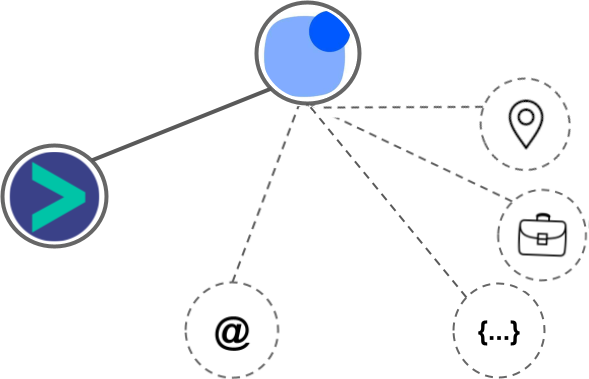Salesforce vs Reply.io
Hyperise integrates with 100's of sales and marketing tools, many of which are in the CRM category. With so many to choose from it's sometimes hard to know which is best, but don't worry, we've got your covered.
In this comparison guide we're going to look at the Highlights, Pros, Cons and Pricing of Salesforce and Reply.io. We'll also delve into the details of which offers the best personalization options within CRM, with there respective Hyperise integrations
Salesforce
Pricing: Salesforce offers a range of pricing options, including: 1. Salesforce Essentials: Starting at $25 per user per month, this is designed for small businesses and includes sales and customer service apps. 2. Lightning Professional: Starting at $75 per user per month, this includes sales, customer service, and marketing automation apps. 3. Lightning Enterprise: Starting at $150 per user per month, this includes advanced analytics, collaboration tools, and customization options. 4.
Vs

Reply.io
Pricing: Reply.io pricing is based on the number of users and contacts, as well as other features. The pricing grid is available on their website. Prices vary from $64 per month for a team of up to 10 users and up to 25,000 contacts to $400 per month for a team of up to 10 users and up to 500,000 contacts. There are also custom solutions available for larger teams and larger contact databases.Salesforce vs Reply.io Highlights
Salesforce is a comprehensive and robust CRM platform that offers extensive customization options and a suite of integrated functionalities to manage all aspects of customer relations. It provides a wide range of tools for automating sales, marketing, and customer service processes, as well as an extensive collection of third-party apps and services.
On the other hand, Reply is a sales engagement platform that focuses on automating and optimizing sales outreach activities. It offers a range of features to streamline and personalize email campaigns, sequences, and follow-ups, as well as AI-powered tools for lead generation and qualification.
In summary, Salesforce is an all-in-one CRM platform that caters to businesses of all sizes looking for a comprehensive and scalable solution to manage their customer relations, while Reply is a specialized sales engagement platform that focuses on helping sales teams streamline and optimize their outreach activities.
Salesforce vs Reply.io Pros
Salesforce Pros
- Robust and extensive CRM functionalities with a range of in-built features for sales, marketing and customer service management
- Highly customizable and flexible to cater to specific business needs
- Advanced analytics and reporting capabilities, including AI-powered forecasting and data-driven insights
- High scalability and ability to handle large data volumes
- Easy to integrate with other systems and applications
- Established ecosystem of third-party apps and plugins available on AppExchange
- Excellent community support with a wide range of resources and forums available for users
- Extensive security measures and compliance certifications for data protection
- Strong mobile capabilities with native mobile apps for both iOS and Android platforms
Reply.io Pros
- Reply has a more cost-effective pricing structure compared to Salesforce.
- Reply offers a user-friendly and easy-to-navigate interface that can benefit small and medium-sized businesses.
- With Reply, users can create customized email campaigns, including personalized messages, autoresponder emails, and A/B testing.
- Reply offers advanced email tracking functionalities, including open rates, click-through rates, and response rates.
- The platform allows for integration with various third-party applications and services.
- The platform offers detailed reporting and analytics capabilities to help businesses refine their sales and marketing strategies.
- The customer support team is highly responsive and available 24/7 to answer questions and provide support.
Salesforce vs Reply.io Cons
Salesforce Cons
- Sure, here are the cons of Salesforce compared to Reply:
- More expensive: Salesforce can be significantly more expensive compared to Reply, especially for small and medium-sized businesses.
- Steep learning curve: Salesforce involves a steep learning curve, which can be time-consuming and overwhelming for users who are not technically inclined.
- Complex customization: Customizing Salesforce can be complex, and it often requires an experienced developer to achieve the desired outcomes.
- Limited customer support: Salesforce customer support can be limited compared to other platforms, and users may have to pay extra for additional support services.
- Integration issues: Salesforce can be challenging to integrate with third-party platforms and tools, which can result in additional time and costs.
Reply.io Cons
- Limited customization options
- Limited integrations with third-party tools
- No built-in marketing automation features
- Limited reporting and analytics capabilities
- Limited support for small and mid-sized businesses
- Limited mobile app functionality
- Steep learning curve for non-technical users
Salesforce & Reply.io Hyperise Integrations
Salesforce uses the HTML code embed method to integrate with Hyperise, giving a simple way to add personalized images to your messages.
Salesforce makes the following data points available to Hyperise, to enable personalization in images used in outreach and linked out to your personalized website landing pages.
- Using business Email passed from Salesforce, Hyperise is able to enrich business logo and website screenshots. In some cases, with a business Email we're also able to enrich profile images, subject to the business email having a publicly available profile.
- Using business Website passed from Salesforce, Hyperise is able to enrich business logo and website screenshots.
- Business name
- City
- State
- Country
- Zip
- Category
Salesforce Integration Guide
Reply.io uses the Image embed method to integrate with Hyperise, giving a simple way to add personalized images to your messages.
Reply.io makes the following data points available to Hyperise, to enable personalization in images used in outreach and linked out to your personalized website landing pages.

- Using business Email passed from Reply.io, Hyperise is able to enrich business logo and website screenshots. In some cases, with a business Email we're also able to enrich profile images, subject to the business email having a publicly available profile.
- Business name
- Job title
- City
- Country
- State
Reply.io Integration Guide
 vs
vs  vs
vs  vs
vs  vs
vs  vs
vs  vs
vs  vs
vs  vs
vs  vs
vs 


 vs
vs  vs
vs 
 vs
vs 
 vs
vs  vs
vs  vs
vs  vs
vs  vs
vs 


 vs
vs 







 vs
vs  vs
vs 




